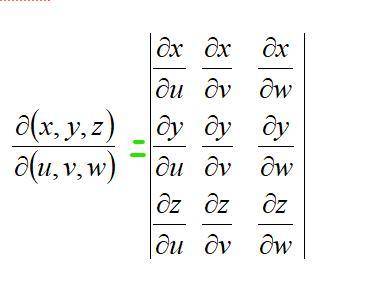
Mathematics, 21.04.2020 16:51 alyviariggins
Find the Jacobian ∂(x, y, z) ∂(u, v, w) for the indicated change of variables. If x = f(u, v, w), y = g(u, v, w), and z = h(u, v, w), then the Jacobian of x, y, and z with respect to u, v, and w is ∂(x, y, z) ∂(u, v, w) = ∂x ∂u ∂x ∂v ∂x ∂w ∂y ∂u ∂y ∂v ∂y ∂w ∂z ∂u ∂z ∂v ∂z ∂w . x = 1 6 (u + v), y = 1 6 (u − v), z = 6uvw

Answers: 3


Another question on Mathematics

Mathematics, 21.06.2019 15:00
Adifferent website gives the cost for the first train as £56.88 and the second train as £20.11 with a £9.50 charge for cycle storage for the whole trip. how much would the journey cost you?
Answers: 2


Mathematics, 21.06.2019 18:00
Adj has a total of 1075 dance and rock songs on her system. the dance selection is 4 times the size of the rock selection. write a system of equations to represent the situation.
Answers: 1

Mathematics, 21.06.2019 23:00
Match the vocabulary to the proper definition. in probability, two events in which 1. conditional probability the outcome of one event is independent of the outcome of a second event. 2. dependent events in probability, two events in which the outcome of one event is dependent on the outcome of a second event. the probability of an event in which the outcome of the event is conditional on the outcome of one or more different events. 3. independent events
Answers: 2
You know the right answer?
Find the Jacobian ∂(x, y, z) ∂(u, v, w) for the indicated change of variables. If x = f(u, v, w), y...
Questions




Mathematics, 13.08.2021 19:00


Mathematics, 13.08.2021 19:00

Mathematics, 13.08.2021 19:10






Mathematics, 13.08.2021 19:10


Mathematics, 13.08.2021 19:10


English, 13.08.2021 19:10

Mathematics, 13.08.2021 19:10
















